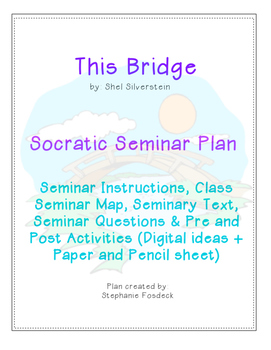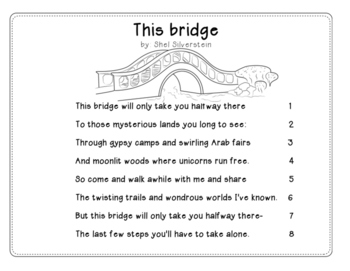Shel Silverstein's THIS BRIDGE Socratic Seminar Plan + MANY Extras!
Stephanie Fosdeck
55 Followers
Grade Levels
3rd - 6th
Subjects
Resource Type
Standards
CCSSRL.3.1
CCSSRL.3.5
CCSSRL.3.10
CCSSRL.4.1
CCSSRL.4.5
Formats Included
- PDF
Pages
7 pages
Stephanie Fosdeck
55 Followers
Description
Are your students struggling with interpreting poetry? Build confidence and comprehension with this short, imaginative poem by Shel Silverstein.
This Socratic seminar plan is designed to help students become more comfortable with prose. As is, it’s appropriate for grades 4th-6th. It could also be used in 3rd, with some modification of questions to help them understand symbolism and figurative language.
In general, Socratic seminar is a fantastic way to engage your students in thoughtful conversation and meet the Speaking and Listening goals of the Common Core.
Used regularly, teachers can identify areas where students need further practice. It can also be used as an excellent form of post assessment.
This seminar plan includes:
* Pre-Seminar activity
* Typed copy of poem (This Bridge) for seminar purposes only
* Seminar Questions (opening, core and closing)
*Digital Post-Seminar activity ideas to choose from
*Paper and Pencil Post-Seminar My Bridge activity
* Seminar Web for tracking student participation
* Seminar How-To sheet (lays out how to set rules and facilitate)
This Socratic seminar plan is designed to help students become more comfortable with prose. As is, it’s appropriate for grades 4th-6th. It could also be used in 3rd, with some modification of questions to help them understand symbolism and figurative language.
In general, Socratic seminar is a fantastic way to engage your students in thoughtful conversation and meet the Speaking and Listening goals of the Common Core.
Used regularly, teachers can identify areas where students need further practice. It can also be used as an excellent form of post assessment.
This seminar plan includes:
* Pre-Seminar activity
* Typed copy of poem (This Bridge) for seminar purposes only
* Seminar Questions (opening, core and closing)
*Digital Post-Seminar activity ideas to choose from
*Paper and Pencil Post-Seminar My Bridge activity
* Seminar Web for tracking student participation
* Seminar How-To sheet (lays out how to set rules and facilitate)
Total Pages
7 pages
Answer Key
Does not apply
Teaching Duration
45 minutes
Last updated Oct 23rd, 2016
Report this resource to TPT
Reported resources will be reviewed by our team. Report this resource to let us know if this resource violates TPT’s content guidelines.
Standards
to see state-specific standards (only available in the US).
CCSSRL.3.1
Ask and answer questions to demonstrate understanding of a text, referring explicitly to the text as the basis for the answers.
CCSSRL.3.5
Refer to parts of stories, dramas, and poems when writing or speaking about a text, using terms such as chapter, scene, and stanza; describe how each successive part builds on earlier sections.
CCSSRL.3.10
By the end of the year, read and comprehend literature, including stories, dramas, and poetry, at the high end of the grades 2–3 text complexity band independently and proficiently.
CCSSRL.4.1
Refer to details and examples in a text when explaining what the text says explicitly and when drawing inferences from the text.
CCSSRL.4.5
Explain major differences between poems, drama, and prose, and refer to the structural elements of poems (e.g., verse, rhythm, meter) and drama (e.g., casts of characters, settings, descriptions, dialogue, stage directions) when writing or speaking about a text.




